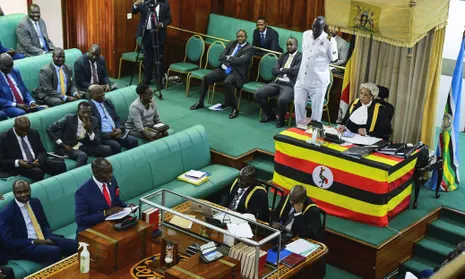
The digital landscape in Uganda has experienced a historic milestone as the Minister for ICT and National Guidance, Chris Baryomunsi, announced a substantial 50% reduction in internet price. This phenomenal decision will take effect on 1st of August 2023, reducing the Internet price from $70 to $35 per Mbps per month.
The Government’s Role in Internet Price Reduction
According to Minister Chris Baryomunsi, the Ugandan Government has played a pivotal role as the undisputed market leader in setting Internet prices. “This landmark achievement solidifies the Government’s position,” Baryomunsi stated during a press briefing with the National Information Technology Authority (NITA Uganda) at the media center.
The trajectory of Internet prices in Uganda has witnessed a significant transformation. Formerly, the cost was around $1,200 per Mbps, reduced to $600 in 2014, and then further down to $300 in 2016. These progressive changes came as more Government MDAs and public offices were connected to the National Backbone Infrastructure (NBI).
Impact on Private Internet Service Providers
The newly announced price cut is not only a stride towards affordable Internet for Ugandans but also a strategic move. Baryomunsi emphasized that the decision would inspire Private Internet Service Providers (ISPs) to follow suit. The ripple effect of this bold initiative aims at unlocking unprecedented opportunities in innovation growth and development, making Internet services more accessible across the nation.
The Role of NITA and the National Data Transmission Backbone Infrastructure Project (NBI)
The first phases of the National Data Transmission Backbone Infrastructure project (NBI) have been expedited by NITA, receiving praise from the Minister. Serving as the primary vehicle for all Government data, Internet, and voice services, the NBI has been instrumental in lowering the cost of communication across governmental platforms.
This secure high-speed network has not only contributed to the reduction of Internet price but also enabled the extension of the geographic reach of broadband networks across the country. Spanning 4,300km, the National Backbone now extends connectivity to around 4,360 Government offices, touching all regions of the nation.
Conclusion
The 50% reduction in the price of the Internet announced by Minister for ICT and National Guidance Chris Baryomunsi marks a significant advancement in Uganda’s digital landscape. Collaborating with NITA Uganda and leveraging the NBI, the Government has made strides towards making the Internet more affordable and accessible. The future seems bright for Ugandans, with the promise of further growth and innovation in the ICT sector. The move sets a benchmark for Private ISPs to follow and creates a ripple effect that can potentially transform the entire Internet ecosystem in Uganda.
In the words of Baryomunsi, this action is more than a price cut; it’s a step towards a digitally empowered Uganda, making the country more globally competitive and paving the way for exponential development. The continued commitment of the Government to innovate and improve Internet services is a testament to its dedication to the citizens of Uganda.



















